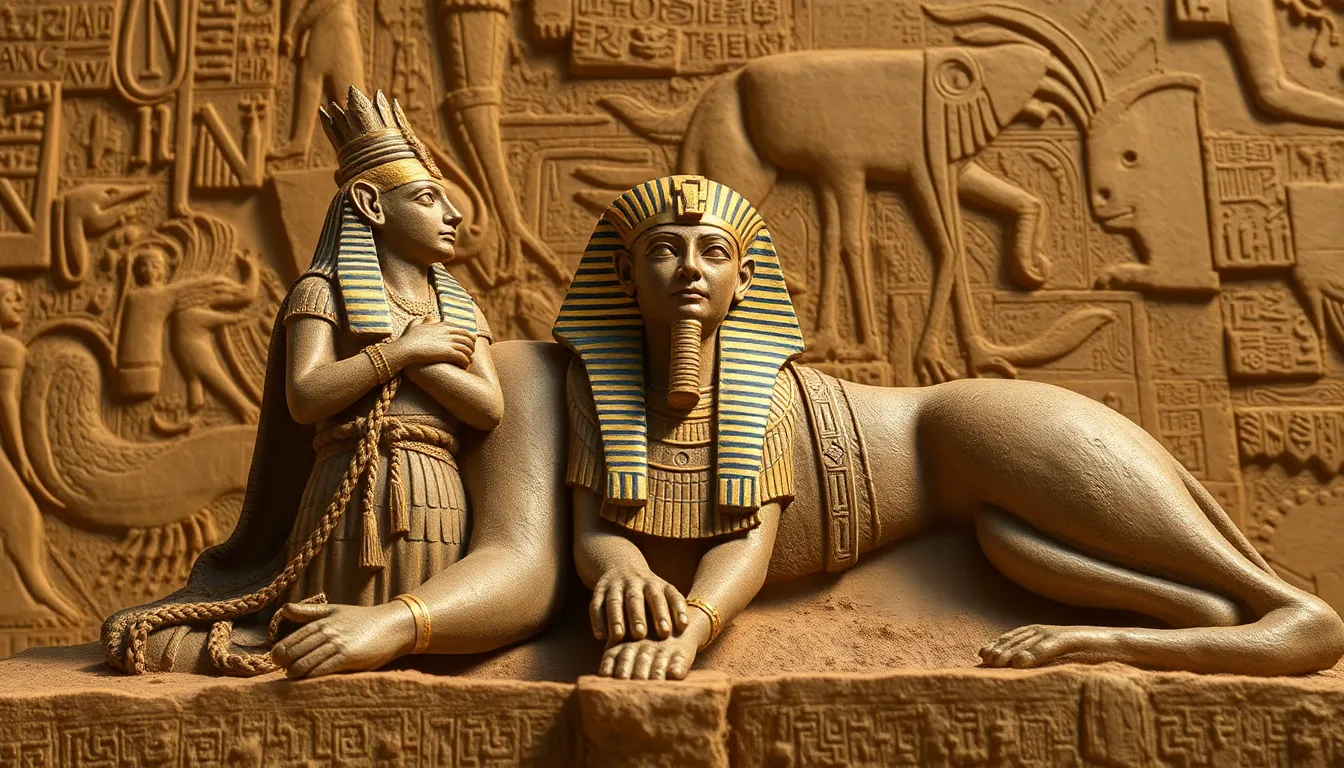The Role of the Pharaoh in Funerary Literature
I. Introduction
Funerary literature in ancient Egypt encompasses the various texts, inscriptions, and artifacts associated with the burial practices and beliefs surrounding the afterlife. These texts played a fundamental role in guiding the deceased through the afterlife, ensuring their safe passage and eternal existence.
The Pharaoh, as the divine ruler of Egypt, held immense significance in ancient Egyptian culture. His position was not only political but also religious, as he was considered a mediator between the gods and the people. This dual role made the Pharaoh central to the beliefs and practices surrounding death and the afterlife.
The purpose of this article is to explore the multifaceted role of the Pharaoh within funerary literature, examining how these texts reflect his divine status and the cultural values of ancient Egypt.
II. Historical Context of Funerary Literature
The evolution of funerary texts from the Old Kingdom to the Ptolemaic period reveals a rich tapestry of beliefs and practices. Initially, funerary literature was inscribed within the pyramids, with the Pyramid Texts serving as the earliest known examples. Over time, these texts evolved into more accessible forms, such as the Coffin Texts and the Book of the Dead, reflecting the changing beliefs about the afterlife.
Key historical events, such as the unification of Upper and Lower Egypt and the shifts in religious practices, greatly influenced funerary practices. The importance of the afterlife in ancient Egyptian belief systems cannot be overstated; it was seen as the ultimate goal of life, where one would continue to exist in a realm similar to that of the living.
III. The Pharaoh as a Central Figure in Funerary Literature
The Pharaoh’s divine status is paramount in funerary literature. He was believed to be a god on earth, and upon his death, he would take his place among the gods. This transformation is vividly depicted in various funerary texts.
- Divine Status: The Pharaoh was often referred to as “the living Horus,” symbolizing his connection to the divine.
- Role in the Afterlife: He was thought to ascend to the heavens and join the sun god Ra, ensuring continued harmony in the cosmos.
In funerary texts and inscriptions, the Pharaoh is often portrayed in majestic scenes, receiving offerings from the living and engaging with deities. This representation highlights his ongoing influence in both the mortal and divine realms.
The symbolism of the Pharaoh’s journey to the afterlife is rich and complex, often depicted through elaborate rituals and offerings that were believed to aid in his passage and sustain him in the afterlife.
IV. Major Funerary Texts and Their Connections to the Pharaoh
Several major funerary texts illustrate the Pharaoh’s portrayal and significance in the afterlife:
- The Pyramid Texts: These are some of the oldest religious texts in the world, designed to protect the Pharaoh in the afterlife and ensure his resurrection.
- The Coffin Texts: Expanding upon the Pyramid Texts, these were meant for the elite and included spells and rituals that guided the deceased through the afterlife.
- The Book of the Dead: This collection of spells provided instructions for navigating the afterlife, emphasizing the Pharaoh’s continued role as a divine figure.
In analyzing these texts, one can see how the Pharaoh’s portrayal evolves, yet consistently underscores his divine status and the expectations of his role in the afterlife.
V. Rituals and Offerings Associated with the Pharaoh
Funerary rituals for the Pharaoh’s burial were grand and meticulously planned, reflecting his importance. These rituals included:
- Embalming and mummification processes to preserve the body.
- Construction of elaborate tombs, such as pyramids, filled with treasures and goods.
- Public ceremonies to honor the Pharaoh and facilitate his transition to the afterlife.
The significance of offerings in funerary literature is profound. Offerings included food, drink, and valuable items, which were thought to sustain the Pharaoh in the afterlife. Literary representations of these offerings often emphasized their importance in ensuring the Pharaoh’s continued influence on the living and the prosperity of the land.
VI. The Pharaoh’s Legacy in Funerary Literature
Funerary literature serves as a reflection of the Pharaoh’s legacy, capturing his achievements and divine nature. Through these texts, we can understand how Pharaohs sought to immortalize their names and ensure their divine favor in the afterlife.
The impact of Pharaohs on subsequent generations is evident in the continued evolution of funerary practices and literature. Their legacies influenced how later rulers presented themselves and their beliefs regarding the afterlife.
Archaeological findings support these literary narratives, with numerous tombs and artifacts providing insight into the beliefs and practices surrounding the Pharaoh’s death and afterlife.
VII. Comparative Analysis with Other Cultures
When comparing the role of rulers in funerary literature across different cultures, several similarities and differences emerge:
- Similarities: Many cultures, such as those in Mesopotamia and Mesoamerica, also emphasized the importance of the afterlife and the role of rulers in ensuring cosmic order.
- Differences: While Egyptian funerary texts are highly focused on the individual ruler’s journey, other cultures may emphasize collective beliefs more strongly.
Insights gained from these comparisons highlight universal themes of leadership, divinity, and the afterlife, indicating that while practices may differ, the core beliefs often resonate across cultures.
VIII. Conclusion
In summary, the Pharaoh’s significance in funerary literature is profound, reflecting his divine status and the cultural values of ancient Egyptian society. These texts not only served to guide the Pharaoh in the afterlife but also acted as a means of preserving his legacy for future generations.
Reflecting on the enduring impact of these texts, we gain a deeper understanding of ancient Egyptian society and its complex beliefs surrounding death and the afterlife. The study and preservation of funerary literature remain crucial for uncovering the rich history and spirituality of ancient cultures.




